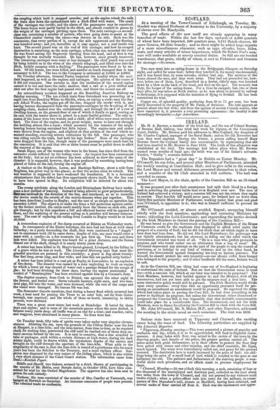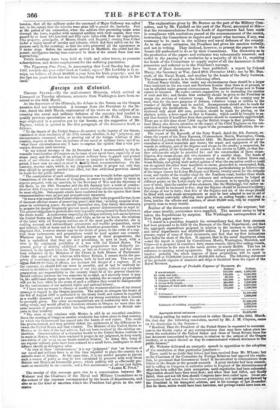IRELAND.
Mr. H. A. Browne, a member of the Irish bar, and the son of Colonel Browne, of Browne Hall, Galway, was tried last week for bigamy, at the Commission Court, Dublin. Mr. Browne paid his addresses to Miss Copland, the daughter of Mr. Charles Copland, manager of the Royal Bank; and on the 5th November last year they were married. During the winter, a person calling herself Mary Downes threw the Copland family into consternation, by representing that she had been married to Mr. Browne in June 1842. The truth of this allegation was established at the trial. The marriage had taken place when Mr. Browne wanted some months of legal age; the bride was one of his father's servants. Verdict, " Guilty "; sentence deferred.
The Repealers had a " great day " in Dublin on Easter Monday. Mr. O'Connell, his son John, and several other Members of Parliament, attended the weekly meeting at Conciliation Hall; and to give eclat to the reunion the Lord Mayor and several Aldermen presented themselves in their robes, and a number of the '82 Club attended in full uniform. The hall was crowded to excess.
The Lord Mayor, in the chair, spoke of the Coercion Bill as an ill-timed measure—
It was proposed just after their countrymen had spilt their blood in a foreign land in achieving the greatest battle that evin England ever saw. The men of Ireland had achieved a victory, 'end a coercion bill was not the return they ought to receive; That horrible bile would never pass; for Ireland had no fewer than thirty:five patriotic Members'of Parliament, working under that great and good man O'Connell, in opposition to it; who was in himself sufficient to prevent its passing.
Mr. O'Connell avoided, or almost avoided, Repeal; occupying himself chiefly with the food question; applauding and censuring Ministers by turns; ridiculing the Lord-Lieutenant; and expounding the tactics devised by the Irish Members to thwart the passing of the Coercion Bill— He was bound to give the Government and the English Members of the House of Commons credit for the readiness they displayed to afford relief under the prospect of a scarcity of food; but he did not think that all which ought to have beendone had been done. He did not like Lord Heytesbury; his patronage was not rightly administered; but his slowness in doling out the relief which the Government intended was worst of all. "He is a man who prefers protocols to potatoes, and who would rather use an ultimatum than a bag of meal." Mr. O'Connell deprecated any attempt on the part of the people to stop the transit of previsions, or to indulge in any kind of violence; and on the other hand, he warned the Government against trespassing too long on human patience. For himself, he should protect his own tenantry—no one should stiffer from hunger who belonged to his property; and if other landlords did the same, 'reline would be safe.
As to the Coercion Bill, one thing had come out of it—England is beginning to understand the state of Ireland. But see how the Government mean to treat her—with a coercion bill, which at one time was intended to be perpetual I The Irish Members, however, had battled against it; and the Minister, with all his mancenvres, had not yet been able to get the measure read a first time. The same obstructive policy world still be pursued. The Irish Members would divide upon every question: every time that an opportunity presented itself for pro- posing an amendment an amendment would be proposed. He regretted the delay which had taken place in passing the Corn Bill: he had done everything in his power to facilitate its progress; but unless the Government either abandoned or postponed the Coercion Bill, it was impossible that that desirable consummation could take place for a considerable time. The Government, and not the Irish Members, were to blame for allowing the Coercion Bill to clash with the Corn Bill.
Mr. John O'Connell, Mr. N. Maher, M.P., and other Repeaters, addressed the meeting in the strain usual on such occasions. The rent was 2031.
Serious riots have occurred at Tipperary and Clonmel; the exciting cause being the want of food. The following particulars are supplied by the Limerick Reporter. " Tipperary, Monday evening.—This town presented a picture of anarchy and confusion this day, which, it is to be apprehended, will lead to frightful conse- quences. A dray, laden with flour, was seized in the centre of the town by the starving people; and, despite of the police, the greater portion carried off. The police acted with great forbearance; as in their efforts toprotect the flour they were pelted with stones and other missiles, and the chief constable, Mr. Egan, much injured. The army were immediately called out and peace for the present restored. The destitution here is much increased by the price of fuel; ten shil- lings being the price of a small load of turf, which is retailed to the poor at one halfpenny the sod. The patience and forbearance of the starving people is won- derful under such privations, and no efforts made to .procure employment for ;hem- " Clonmel, Monday.—At one o'clock this morning, a mob, consisting of four or five thousand of the unemployed and destitute poor, collected on the road about two miles from the town of Clonmel, and did not proceed to any violence until twelve o'clock; when a police-officer rode into town for the military, in conse- quence of Mrs. Shanahan 's mill, situate at Marlfield, having been attacked, and several sacks of flour carried off from it. Such was the excitement and appre- hension, that all the military under the command of Major Galloway was called out, to the extent that the recruits were alone left to guard the barracks. Just at the period of the commotion, when the soldiers were proceeding under arms through the town, together with mounted artillery with their cannon, they were by at least two hundred and fifty carts laden with flour for exportation, rth7property, principally, of Messrs. Grubb and Sargent,) coming from Caher under a heavy escort of cavalry and infantry, which had been called out for the purpose early m the morning; so that the town presented all the appearance as if milder siege. Before the cavalcade arrived at Marlfield, the crowd had dis- persed; intelligence having been conveyed to them of the armed force that was approaching."
Public meetings have been held at Cork and other towns, to promote subscriptions, and devise employment for the suffering population.
The Tipperary Free Press, in announcing that Lord Stanley has given 1001. towards the poor relief fund at Cashel, says—" His Lordship is in re- ceipt, we believe, of about 20,0001. a year from his Irish property; and for the'last ten years there has not been anything worth naming spent in Ire- land."



























 Previous page
Previous page